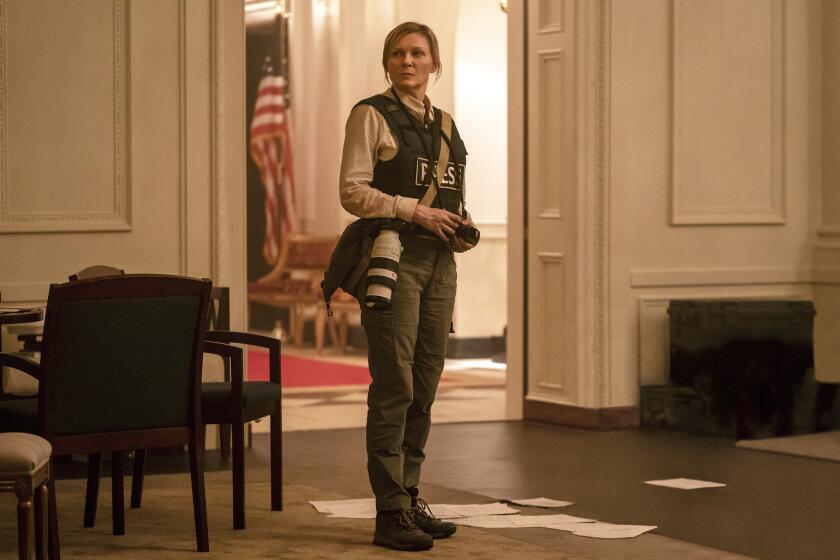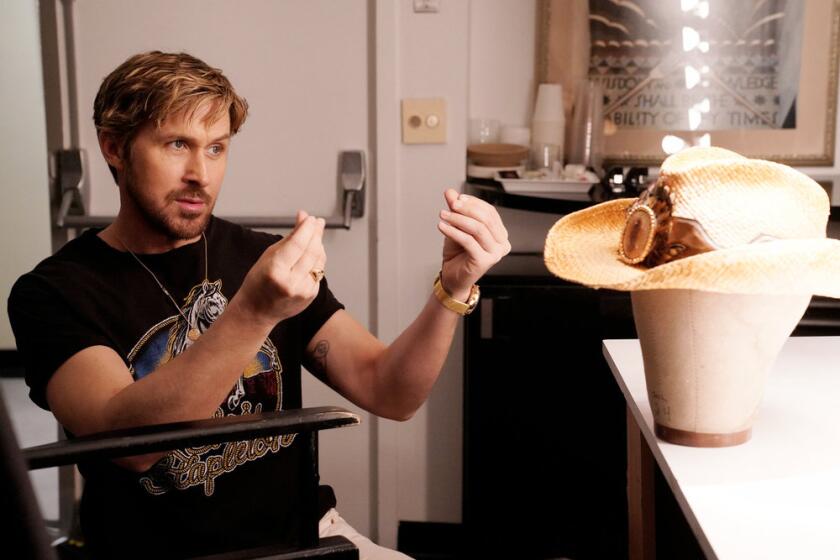Review: ‘Gloria’s’ portrait of older singles brims with authenticity
There is a naturalistic charm to the truth-telling going on in “Gloria,” Chilean director Sebastian Lelio’s near-perfect film about the very imperfect world of a divorced woman of a certain age.
Starring the incomparable Paulina Garcia in every scene — every single one, no exaggeration — the film settles comfortably between romantic comedy and drama. Perhaps the better way to characterize it is affectionately ironic love story.
A quick series of scenes set the pace for a film that keeps moving its characters through various emotional phases. It doesn’t take long to get a sense of Gloria and what she’s up against.
PHOTOS: Behind the scenes of movies and TV
Driving to work she sings along with one romantic song after another. At night she slips into a cocktail dress to go dancing at a local club. When no one notices her at the bar, she wades into the crowd made up of the middle-aged and unattached. Calls to her grown children go to voicemail. Complaints to her apartment manager go ignored. She is an observer determined to be a participant.
Which might sound sad. Yet somehow between Lelio’s ingenuity in staging the film, an extremely clever script co-written with his frequent collaborator, Gonzalo Maza, and the pumping disco that interjects its opinions and assessments of each situation, “Gloria” is one of the most enjoyable movies to come along in a while. It is up for an Independent Spirit Award in the foreign-language category, but surprisingly it didn’t make the academy’s final cut.
Much of the film’s appeal has to do with Garcia, who tosses aside vanity in favor of a don’t-count-me-out brio. That she wears some of the most unattractive glasses — huge and insistently out of style — is no accident, for much of the movie is about perception: How Gloria sees herself and the world, as well as how the world does, or more often does not, see her.
BEST MOVIES OF 2013: Turan | Sharkey | Olsen
Her prospects change one night at the club when she locks eyes with an attractive older man, Rodolfo (Sergio Hernandez), who is recently divorced. Before the night is out they go far beyond sultry dancing. The way Lelio captures sex between fiftysomethings is neither gratuitous nor gross nor glossy. Need, desire and desperation as naked as aging flesh.
An up and down courtship begins, and soon Gloria is bungee-jumping at “Vertigo Park,” which Rodolfo owns. Then the director sets about having everyone unpack all their baggage.
Here reality and metaphor coexist nicely. Gloria’s been divorced 12 years. She has a loving, if somewhat disconnected, relationship with her children, Ana (Fabiola Zamora), a yoga teacher who’s fallen for a backpacking Swede, and Pedro (Diego Fontecilla), on his way to single-fatherhood, a fussy toddler in tow.
Rodolfo is more encumbered, constantly taking calls from his daughters, listening to a litany of calamities befalling his ex. He may be divorced, but he is not separated.
That becomes the central conflict as Gloria and Rodolfo head toward either complete bliss or unmitigated disaster.
Garcia and Hernandez make a potent pair. His hangdog looks and slight air of depression are a perfect counterpoint to Gloria’s effervescence and drive. There is a kind of emotional residue revealed in every move the actress makes, every word she says — it’s one of the reasons she earned the Berlin Film Festival’s actress award, one of three prizes the film received from the festival.
RELATED: More movie reviews by The Times
There are no transitions to speak of. As the camera cuts from one moment to another, sometimes days have gone by, sometime minutes. It doesn’t matter; you never feel lost, everything you need is tucked into the subtext. Refreshing in an age of scripts that over-share.
Costume designer Eduardo Castro, production designer Marcela Urivi and production director Eduardo Castro have given director of photography Benjamin Echazarreta a rich canvas. There is chaos in Gloria’s world; her apartment is a sea of work papers, rumpled sheets and discarded clothes. A neighbor’s hairless cat is about the only living creature that keeps showing up.
In contrast, Rodolfo’s apartment is nearly bare. The places he takes Gloria are more minimalistic and polished, lifeless and cold.
This is Lelio’s fourth film, coming not long after his 2006 breakthrough “La Sagrada Familia,” and his most personal film yet. The director has said he wanted to somehow capture the complexities of life his mother and her friends face as they headed toward 60. He has done so with sensitivity and wit and the help of an impeccable, implacable performance from Garcia.
[Updated 4:11 p.m. PST Jan 23: In an earlier version of this post, Sebastian Lelio’s last name was misspelled as Lileo in the review’s final paragraph.]
---------------------------------
‘Gloria’
MPAA rating: R for sexual content, some graphic nudity, drug use and language
Running time: 1 hour, 50 minutes; Spanish with English subtitles
Playing: At Landmark Theatre, West Los Angeles.
More to Read
Only good movies
Get the Indie Focus newsletter, Mark Olsen's weekly guide to the world of cinema.
You may occasionally receive promotional content from the Los Angeles Times.







